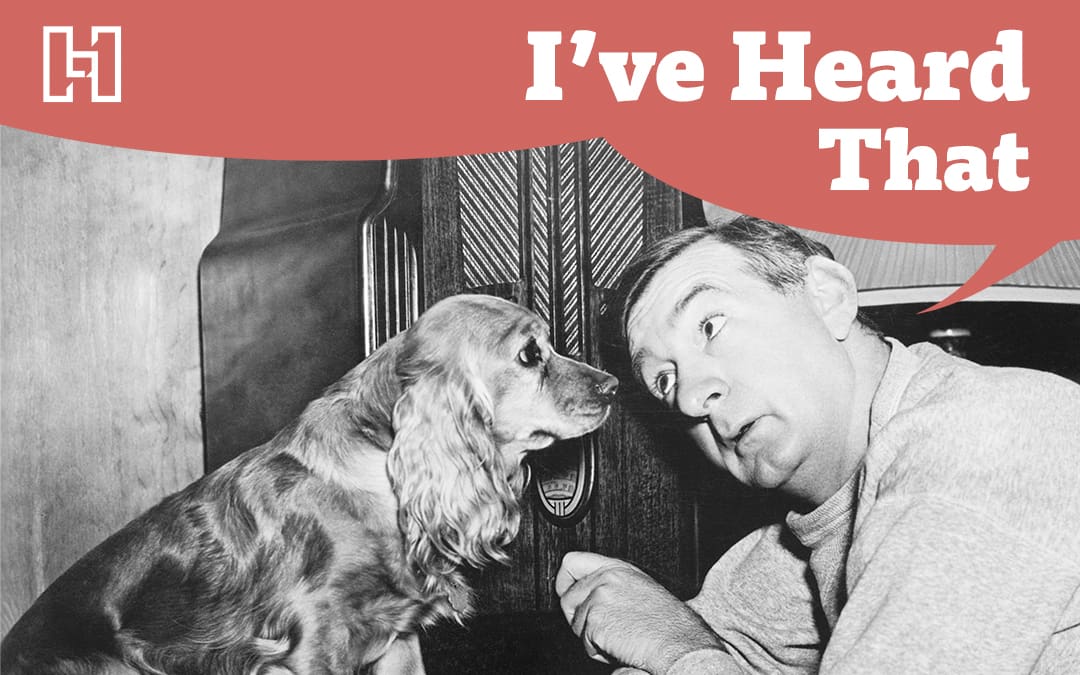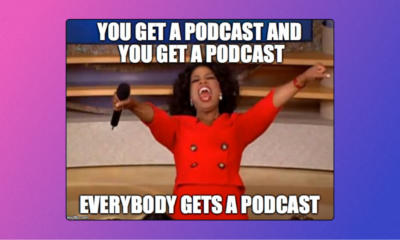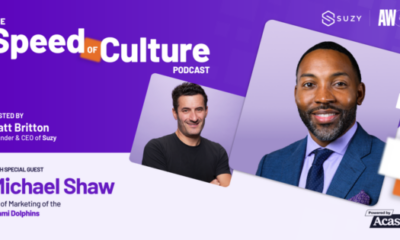The new app is called watchGPT and as I tipped off already, it gives you access to ChatGPT from your Apple Watch. Now the $10,000 question (or more accurately the $3.99 question, as that is the one-time cost of the app) is why having ChatGPT on your wrist is remotely necessary, so let’s dive into what exactly the app can do.
NEWS
I’ve Heard That: Let’s Get Ready to Rumble

Speaker 1 (00:03):
Welcome to I’ve Heard That, the podcast from Hurrdat Marketing that discusses digital marketing trends, tips and more.
Meghan (00:10):
All right. Welcome back. I’m so excited to have a new guest today. Chris, welcome.
Chris (00:15):
Hey, how are you?
Meghan (00:16):
And welcome back, Dan.
Dan (00:18):
What’s up? Thanks for having me back, Meghan.
Meghan (00:19):
Yes, we are covering live events at Hurrdat, and I’m so excited for you guys to share. So there’s a lot that goes into it. I mean, break it down for us, Chris. What happens before anything happens?
Chris (00:34):
Mm-hmm (affirmative). So, event days are my favorite day. Dan and I have been in this industry quite a while and there’s just nothing like being at a live event for 14 hours, trying to tell a coherent story. And we talk to college students or high school students about what we do, we always try to set realistic expectations because-
Meghan (00:57):
Right. They think it’s so sexy, like, “Hey, we’re going to be at like front center row of…”
Chris (01:00):
Right.
Meghan (01:01):
Yeah.
Chris (01:01):
And I always ask, I’m like, “Hey, why do you want to be in sports marketing?” Or, “Why do you want to be in entertainment?” And they’re like, “Oh, I love going to concerts with my friends.” I’m like, “Cool, you’re going to hate this.” I didn’t-
Meghan (01:12):
You’re not going to be watching.
Chris (01:13):
No. I mean, Maha… Dan and I aren’t sitting and able to enjoy any of the bands because we were thinking about 30 other things. Sweetstock this last week. I mean, I didn’t see a single song from a single artist the entire day, just because we were running all day and have all these different responsibilities. So you really have to have a passion for telling a great story during an event. And I think that’s where it starts is just being in that mentality.
Chris (01:38):
Like, hey, I’m not, I’m not here to enjoy this game or this event or this concert or whatever we’re doing. You’re there to do the marketing and be support for the owners of the events or whoever hired you to do so. And I think it goes way back. I mean, my first job, 22 years old at the time, I get flown out to New York and was doing tour managing for bands. The side of that, which we didn’t really know was the job at the time, was doing social media marketing. And it was all about being on MySpace and connecting with the kids in the next city to get them to come out to your show because if you didn’t do that, you weren’t eating. So, I mean, this is almost 20 years ago that we’re talking about doing social media marketing for bands and it’s really just evolved over that time.
Chris (02:25):
And I’ve always had a passion for it. And mainly because I was always the first one to get the computer. This was back in the day of like computer labs or somebody had a computer at their parents’ house. I didn’t have a cell phone at the time. We weren’t able to just upload things via iPhone. So I always loved having the first priority on getting the computers. But I mean, that’s really where it starts is, hey, having a passion for telling a great story about the event that we’re working.
Meghan (02:51):
And what do we do to help plan for the event or rally the team?
Chris (02:57): [crosstalk 00:02:57] Oh, go ahead, Dan.
Dan (02:58):
Well, yeah, dude. I mean, I start in a really different place. I mean, where it starts for me, like a lot of things, is desired outcome from the client or the film or some of those things ring true. And sometimes where we start depends on whether we’re in year one or we’re in year zero. Because what happens a lot of times is client needs to promote coming event. They want to release a video asset in one form or another, broadcast spot, social spot, whatever, whatever, and then are like, “Oh wait, this is year zero. We don’t have any assets. What are we going to go? How are we going to do that?”
Dan (03:48):
So then you, you go into it and then we have done so many different types of event work. And I’m much like Chris, I came way, way back in the day. I did two stints on the Vans Warped tour. A lot of my work previous to this was doing action sports events. But every client potentially is a little bit different of where are we starting to create assets for the library for the next year? Or are we starting with how do we buzz now, buzz now, promote what’s going on? And then a lot of times it’s both of those and it’s just, you change the faders on how maybe from year to year or from client to client…
Dan (04:47):
Like this summer was interesting. It was probably our most events in one time period. We did two music festivals and the final stop of the Korn Ferry Tour, which is the PGA feeder system through the Pinnacle Bank Championship. And all three of those started at totally different places and had totally different agendas from one another. So probably like a lot of Hurrdat things, it’s not, “Hey, let me go to the shelf and get you event coverage. Oh, do you want the supersize fries with your event coverage?” It doesn’t work like that. Everybody’s got some different needs and they’re kind of all over the place. Which is fun. It keeps it exciting.
Chris (05:35):
My philosophy on event coverage is we should always be doing three things. One, selling tickets, two, engaging fans and three, showing sponsor loves. Pretty much every activity that we have fits into one of those three categories.
Meghan (05:51):
Yeah. Whether it’s pre-planning or day of.
Chris (05:53):
Mm-hmm (affirmative).
Meghan (05:53):
Yeah, for sure. So tell me a little bit more about what happens. It’s game day or go time or concert time. I know you guys are up bright and early, no matter what time the event starts. So walk me through a day in the life.
Chris (06:07):
So yeah, it usually starts the night before where we’re kind of game planning about what we’re doing. Obviously it starts well beyond, but actually getting ready for game day. We always want a cooler filled with Red Bulls and snacks.
Dan (06:21):
You always want cooler filled with Red Bull. [crosstalk 00:06:24]
Chris (06:26):
Dan told me early in our career, he’s got a rule that I still live by and it’s feed yourself, feed the team. So making sure that you have things for the team members throughout the day. But really just game planning about what the entire day needs to look like. And generally when you’re working with a client, they’ll hand you a sheet of here’s your must haves, here’s nice to haves, and then here’s, if you get bored, here’s some things that you can do. So understanding what the client goal is.
Chris (06:51):
Because on those days, it rarely feels like we’re a hired hand or a contracted vendor. It very much feels like, and we’ve built these relationships over the years, where it feels like we’re part of the team. And that’s how we prefer to exist in these relationships where it’s like, hey, you can count on us for pretty much anything. Here’s our job, but if you need help, we’re going to be there to help you out. And so identifying what those goals are, and then figuring out the timeframes.
Chris (07:18):
And like Dan will probably tell you is you work backwards from desired result. Like, hey, we need to pop these five sponsors. They’re brand new to the event. We want to make them feel really happy about their investment. And here’s what they’ve been promised too by the salespeople. You co-sign that, Dan?
Dan (07:34):
Yeah. I think you make a really important point about sort of popping sponsors and it is really understanding and I think… so you also see freelance folks jump in sometimes. And it’s really interesting to see the difference in how some of that works. And I totally get it. Because sometimes they’re almost from a fan perspective.
Chris (08:02):
Mm-hmm (affirmative).
Dan (08:03):
The idea that, dude, oh my God, Dave Grohl on stage right now is the most important thing that I need to be covering. And what you can lose in that, like Chris just mentioned, is you’re a partner of the event, you’re a surrogate to provide them, and in my area, cinematic storytelling and cinematic assets, they have sponsors and partners of their own who have invested a lot of dollars to make these events happen. You need to be cognizant of trying to help take care of those things like you become… And what’s been really interesting and really fun as we’ve worked with some of these events year after year, you can see the build, again, at least on the video and films end, of honestly, we create inventory assets. We’re not an expense. We’re actually something for them to sell. Because they can now either…
Dan (09:12):
This goes back to something we were doing prior to Hurrdat. It’s just sometimes mentality is just really interesting the way… It’s marketing, right? If I tell you you’re a platinum sponsor of an action sports event and that costs 60K a year, but then for our five events, I want to charge you $3,000 for commercials to run on the webcast, a brand might feel nickeled and dimed. Like what the, come on, I’m paying you this… But if at the beginning of the year you tell them, oh, it’s 75 grand and you get all of this. And part of what you get is also these spots that run on their webcast. Brands far less like, oh, okay, that seems fair.
Dan (09:56):
And then as a partner, we fall in the role of executing those kinds of things like that. And then it becomes even like the next level almost after year three, four or five, we start collaborating on what those opportunities are. That potentially is another part of, to jump back to the lead in, that informs the day of. And then of that, okay, well, we could produce this. And then they’re like, oh my gosh, that would be awesome. Because like Chris mentioned earlier, we have a new sponsor XYZ and we’re not sure exactly where they fit in on some of the other elements. So that stuff…
Dan (10:45):
Other game day stuff for us in the films division, but actually it’s the same Chris overseeing social, which I know seems super basic, but it’s really important and gets super messed up, batteries are charged. [crosstalk 00:11:01] available. Media’s clean. Batteries are charged. Because it will a million percent happen where, and we speak from experience, where like, yeah, whatever, it’s no big deal. I’m hardly shooting. Oops, forgot to charge batteries. Event director comes over on the last day and is like, hey, still photographer, actually, okay, here’s your day. We need like 90 shots. Here you go. And it’s like, oh, I’m out of battery. So yeah, it’s just making sure that taking care of those basics.
Dan (11:39):
We also try to get a lay of the land if we haven’t been there before. We try to get there early and kind of take a buzz around so we can kind of even understand the function. So we just did nineties kind of music, legacy artists festival, and you would think, oh, we’re media partner, we should enter where the VIP is. That’ll be easy for us. Well, actually the way that this venue ended up laid out, if we had done that, that would have absolutely been the farthest place possible from where we needed to go in. So just kind of figuring out some of that kind of stuff.
Dan (12:28):
And then, like Chris mentioned earlier, working backwards is super important in sort of a very practical sense where you’re like, okay, if the DJ walks on stage at two and we need camera people in the photo pit and then they need social people at the door as people are clicking and coming in, okay, you retro engineer that. All right. How long to get our passes? Okay, okay. If we get our passes the night before… You back out of that instead of just thinking about, oh, well doors open at 11. Okay. But if you need to actually be covering that, you need to be in position at 11. So what does it take you to get there?
Meghan (13:15):
Yeah. And I know sometimes you’ve just mentioned a lot of people that are actually on site, but we also have offsite team members sometimes that are helping, because there’s so much, like wifi, for example, that you have to account for. Will we be able to drop that? Will we have mobile service or is somebody physically going to have to run this from point A to point B? How are we going to get this? How’s the team going to work and flex together throughout the day?
Chris (13:37):
Yeah. From a social perspective, it’s super handy to have somebody that is in a controlled environment, consistent wifi, they have a keyboard in front of them, they aren’t trying to do things on the fly and log in to different accounts and everything. So from event perspective for social, love having somebody off site. Because then we can take assets, photos, videos, whatever, and then move those over to the person off site and they aren’t… Because especially when we walk a site early, we’re like, oh my gosh, wifi is awesome. And then you jam 6,000 people into the area and be like our wifi is really not as good as we thought it was going to be. And most events and venues, they’ll even set up, this last one, that festival that we did, we had a private wifi server that we were connecting to. Still wasn’t strong enough. It was easier to do it over a cell phone.
Dan (14:26):
And we’re just in a lot of different environments too. What’s really nice about the remote person on that social side, and sometimes they’ll drop video assets to them too. Again, every festival, or every event I should, because it’s not just music we do, is different. Sometimes you’re not in a really secured place. So there’s not a good space for somebody to pop up with their laptop, have power, have wifi and be uninhibited, not having people around. Also it helps not having their faces melt with sweat dripping onto their laptop. Because most of these are outdoors. Most of them are the summertime.
Chris (15:05):
Mm-hmm (affirmative). [crosstalk 00:15:08] I mean, you think about being around the cage for a fight that we’re doing and those lights are so bright and you’re just melting there. Your computers are melting.
Meghan (15:18):
Someone’s dripping sweat on you and-
Chris (15:20):
Yeah, and other stuff. [crosstalk 00:15:22].
Meghan (15:21):
Yeah, it drops down there. So day of obviously is a blur and then a lot of work to still be done after the event. So what happens after an event?
Chris (15:32):
So for social, we always have a few days after the event that we’re kind of controlling things too. And it’s really helpful from, in any of the events that we work with, they’ll tell you the same thing, having dedicated social people is a huge blessing. Because a lot of times a lot of these events they’ve relied on themselves or an intern or whatever that has 40 other jobs to be doing to be working on social. So having dedicated people that are only thinking about social has been super helpful. And generally that leaks a few days after the event so we can post any thank you assets, things that need to go out, do a little bit of community management afterwards. And then go into reporting to see how the event did. Especially these multi-year events, it’s really good to see, okay, hey, we’ve been improving every year with our engagement, which what it should do on social.
Meghan (16:22):
Yeah.
Chris (16:22):
Yeah. If you see a dip usually it means something’s wrong. But going into reporting things like that. And then just preparing for the next year. Figuring out what we can do and doing a little internal Monday morning quarterbacking for our team to say, okay, this went well, this is what we need to improve on, here’s the changes that we make for next year. But Dan obviously has a quite bigger workload post events.
Dan (16:44):
I think it’s interesting when you look at the videos set up when we’re working with an event and then how it matches also with socials. It’s like a bell curve where in the middle… So for films and video, I’d say it’s typically like a four or five on the run up. It’s maybe like a six or seven for covering the event, but then it’s also like another six or seven post. Sorry, on a scale of 10 of how intense we’re going. Where social is usually pretty low on the run-up, they’re super maximized, doing tons of stuff during the event and then they kind of pod down.
Dan (17:33):
But the thing you got to remember, we now need to create something out of what we’ve shot. And that’s also changed a little bit over the year. It’s a really interesting symbiotic relationship with social and video. So there was a time period, even in the trajectory of Hurrdat, where most of the social content coming out during the event was produced by the films division. We’re doing same day edits. I know we did a really fun thing one year on Twitter for a MMA fight where we basically told a story throughout the day. We got each fighter as they arrived and dot, dot, dot. But as equipment, i.e. phones, and then also social platforms have gotten better and limitations have changed and this kind of stuff like that, the things that social can handle in the moment have kind of moved over to them.
Dan (18:34):
And then we are taxed a lot with, I like to refer to it as long lasting assets. Both video footage and then we’re typically creating a really high quality, wrap-up video. So we also have this after process, both in the whole event, but also by the day. And anybody in production knows, I mean, it’s called dumping media. Social gets to go home or the event gets to go home. Well, we have six cards that we need to back up, double backup, make our redundancies, clean our cards so we can come back the next day. And then ultimately, when the whole event is done…
Dan (19:13):
And we’re so stoked. We just expanded our team. We’ve got an assistant editor on board now. A really good guy named Sam Brennan. And this is part of what assistant editors do is like, cool, time to log this. You need to transcode all that footage and then you need to log it so that you can find it of like, whatever, what was day one, where’s all the 98 Degrees stuff, where’s this fight, where’s that fight. And then catalog that because we’re producing this wrap-up video, it goes away, but like Chris was saying, when we started prepping for the next year and you cycle to the time that event wants to advertise event X in 2021 wants to advertise for 2022, we’re getting a call back in March of it’s like, okay, we need to maybe start thinking about our broadcast commercial. And we need to be able to access in a fast, concise manner, the stuff that we shot the previous year.
Dan (20:15):
So it’s really kind of an interesting… We coincide with social in the middle of the event, but they’re probably a little bit more… Because they have to get stuff in the moment because it’s like, hey, you have to show that gate’s open. You have to show that like the merch stand is going off or that this venue… And we get to be a little bit more cinematic and because we’re doing post-work where like, mm, I don’t know, the light’s kind of not great here right now, we’ll come back or we’ll do it at like a different time. So there’s just some interesting little differences, but yeah, our post event out is much heavier than the social teams.
Meghan (21:04):
Well, and then do you go back through and fill with B roll stuff too? So to your point, social is collecting and using assets basically as they’re coming in and you’re cataloging it all out so you can go back and say, oh, well we liked the story, but we didn’t get that shot shot so we’re going to handpick it. Maybe it was your story at night, but you’re handpicking a shot from the morning. Just a little cheat [crosstalk 00:21:27].
Dan (21:27):
Yeah, absolutely. You’re you’re doing the whole, like you shoot both magic hours and magic hour is magic hour. You don’t really know on film whether it’s night or day as you get into some of that stuff. And again, you just sort of think about that. And our coverage has really evolved over time. I know Chris had a really great thing that he said earlier about selling tickets, which nine times out of 10 is on the agenda for the event. Again, we try really hard not to lose sight of that, even in some of the Monday morning quarterback-esque stuff. We’ve done some stuff where we look at client and it’s really cool and it’s really neat and rewarding when we’re like, oh my God, did you see how much… We produced a dozen, amazing 30 or 60 second high quality, cinematic, well produced video clips throughout the tournament. Oh, that’s great.
Dan (22:25):
But then when we’re patting ourselves on the back, we don’t do it for too long because if you look at it and you go, oh, wait a minute. So nine of those came out Sunday between 11 in the morning and 1:30, the last day of a four day event. So Chris and I would kind of joke. We’d be like, oh, we just did garbage dump theater. That’s not good. Because you’re not helping your client anymore. You’re not helping the event. Because at that point, how many people are, they’ve already made up their minds by 11:00 on the Sunday of an event that’s day four of four and ends at 5:00, your tool can’t help them.
Dan (23:08):
But yeah. So again, that’s part of our post-game process too. Of it’s like, hey, okay, we made some great stuff, but maybe we did it in a way that wasn’t as helpful as it could be. How do we take what we’re doing and for next year, let’s move it around. Hey, what if we produce more of those things in advance for you? Would that help, whatever, sell more tickets, get more sponsors so that you can continue our events? So that’s kind of part of the aftermath as well.
Meghan (23:39):
Yeah. Awesome. No, I think I’m back to selling tickets, it’s telling that story to either create nostalgia for, hey, we went to this last year. I’m so excited for it this year. Or it’s that FOMO, like I can’t believe we missed out on that. Look at how awesome this was. I’m pumped to go this year. So yeah, you guys do an awesome job. Two different worlds, but they come together on game day.
Dan (24:01):
Yeah, they sure do.
Meghan (24:03):
Awesome. Well, thank you so much for joining us guys. I really appreciate your expertise again. Be sure to like, rate and subscribe. We have new episodes coming out every other Wednesday. So thanks again, guys.
Chris (24:16):
Thanks Megan. Thanks Dan. Later, guys.
Speaker 1 (24:19):
I’ve Heard That is a part of the Hurrdat Media Network. For more information follow Hurrdat on Facebook, LinkedIn, Twitter, or Instagram, or visit hurrdatmarketing.com.
Speaker 5 (24:28):
A Hurrdat Media production.
Source: Hurrdat
Facebook Faces Yet Another Outage: Platform Encounters Technical Issues Again

Uppdated: It seems that today’s issues with Facebook haven’t affected as many users as the last time. A smaller group of people appears to be impacted this time around, which is a relief compared to the larger incident before. Nevertheless, it’s still frustrating for those affected, and hopefully, the issues will be resolved soon by the Facebook team.
Facebook had another problem today (March 20, 2024). According to Downdetector, a website that shows when other websites are not working, many people had trouble using Facebook.
This isn’t the first time Facebook has had issues. Just a little while ago, there was another problem that stopped people from using the site. Today, when people tried to use Facebook, it didn’t work like it should. People couldn’t see their friends’ posts, and sometimes the website wouldn’t even load.
Downdetector, which watches out for problems on websites, showed that lots of people were having trouble with Facebook. People from all over the world said they couldn’t use the site, and they were not happy about it.
When websites like Facebook have problems, it affects a lot of people. It’s not just about not being able to see posts or chat with friends. It can also impact businesses that use Facebook to reach customers.
Since Facebook owns Messenger and Instagram, the problems with Facebook also meant that people had trouble using these apps. It made the situation even more frustrating for many users, who rely on these apps to stay connected with others.
During this recent problem, one thing is obvious: the internet is always changing, and even big websites like Facebook can have problems. While people wait for Facebook to fix the issue, it shows us how easily things online can go wrong. It’s a good reminder that we should have backup plans for staying connected online, just in case something like this happens again.
NEWS
We asked ChatGPT what will be Google (GOOG) stock price for 2030

Investors who have invested in Alphabet Inc. (NASDAQ: GOOG) stock have reaped significant benefits from the company’s robust financial performance over the last five years. Google’s dominance in the online advertising market has been a key driver of the company’s consistent revenue growth and impressive profit margins.
In addition, Google has expanded its operations into related fields such as cloud computing and artificial intelligence. These areas show great promise as future growth drivers, making them increasingly attractive to investors. Notably, Alphabet’s stock price has been rising due to investor interest in the company’s recent initiatives in the fast-developing field of artificial intelligence (AI), adding generative AI features to Gmail and Google Docs.
However, when it comes to predicting the future pricing of a corporation like Google, there are many factors to consider. With this in mind, Finbold turned to the artificial intelligence tool ChatGPT to suggest a likely pricing range for GOOG stock by 2030. Although the tool was unable to give a definitive price range, it did note the following:
“Over the long term, Google has a track record of strong financial performance and has shown an ability to adapt to changing market conditions. As such, it’s reasonable to expect that Google’s stock price may continue to appreciate over time.”
GOOG stock price prediction
While attempting to estimate the price range of future transactions, it is essential to consider a variety of measures in addition to the AI chat tool, which includes deep learning algorithms and stock market experts.
Finbold collected forecasts provided by CoinPriceForecast, a finance prediction tool that utilizes machine self-learning technology, to anticipate Google stock price by the end of 2030 to compare with ChatGPT’s projection.
According to the most recent long-term estimate, which Finbold obtained on March 20, the price of Google will rise beyond $200 in 2030 and touch $247 by the end of the year, which would indicate a 141% gain from today to the end of the year.
Google has been assigned a recommendation of ‘strong buy’ by the majority of analysts working on Wall Street for a more near-term time frame. Significantly, 36 analysts of the 48 have recommended a “strong buy,” while seven people have advocated a “buy.” The remaining five analysts had given a ‘hold’ rating.

The average price projection for Alphabet stock over the last three months has been $125.32; this objective represents a 22.31% upside from its current price. It’s interesting to note that the maximum price forecast for the next year is $160, representing a gain of 56.16% from the stock’s current price of $102.46.
While the outlook for Google stock may be positive, it’s important to keep in mind that some potential challenges and risks could impact its performance, including competition from ChatGPT itself, which could affect Google’s price.
Disclaimer: The content on this site should not be considered investment advice. Investing is speculative. When investing, your capital is at risk.
NEWS
This Apple Watch app brings ChatGPT to your wrist — here’s why you want it

ChatGPT feels like it is everywhere at the moment; the AI-powered tool is rapidly starting to feel like internet connected home devices where you are left wondering if your flower pot really needed Bluetooth. However, after hearing about a new Apple Watch app that brings ChatGPT to your favorite wrist computer, I’m actually convinced this one is worth checking out.
-

 MARKETING7 days ago
MARKETING7 days agoRoundel Media Studio: What to Expect From Target’s New Self-Service Platform
-

 SEO6 days ago
SEO6 days agoGoogle Limits News Links In California Over Proposed ‘Link Tax’ Law
-

 SEARCHENGINES6 days ago
SEARCHENGINES6 days agoGoogle Core Update Volatility, Helpful Content Update Gone, Dangerous Google Search Results & Google Ads Confusion
-
SEARCHENGINES7 days ago
Daily Search Forum Recap: April 12, 2024
-

 SEO5 days ago
SEO5 days ago10 Paid Search & PPC Planning Best Practices
-

 MARKETING6 days ago
MARKETING6 days ago2 Ways to Take Back the Power in Your Business: Part 2
-

 SEARCHENGINES4 days ago
SEARCHENGINES4 days agoWeekend Google Core Ranking Volatility
-

 MARKETING4 days ago
MARKETING4 days ago5 Psychological Tactics to Write Better Emails









![The State Of SEO 2024: Disruptions And Opportunities [Podcast] The State Of SEO 2024: Disruptions And Opportunities [Podcast]](https://articles.entireweb.com/wp-content/uploads/2023/08/The-State-Of-SEO-2024-Disruptions-And-Opportunities-Podcast-400x240.jpg)
![The State Of SEO 2024: Disruptions And Opportunities [Podcast] The State Of SEO 2024: Disruptions And Opportunities [Podcast]](https://articles.entireweb.com/wp-content/uploads/2023/08/The-State-Of-SEO-2024-Disruptions-And-Opportunities-Podcast-80x80.jpg)




You must be logged in to post a comment Login